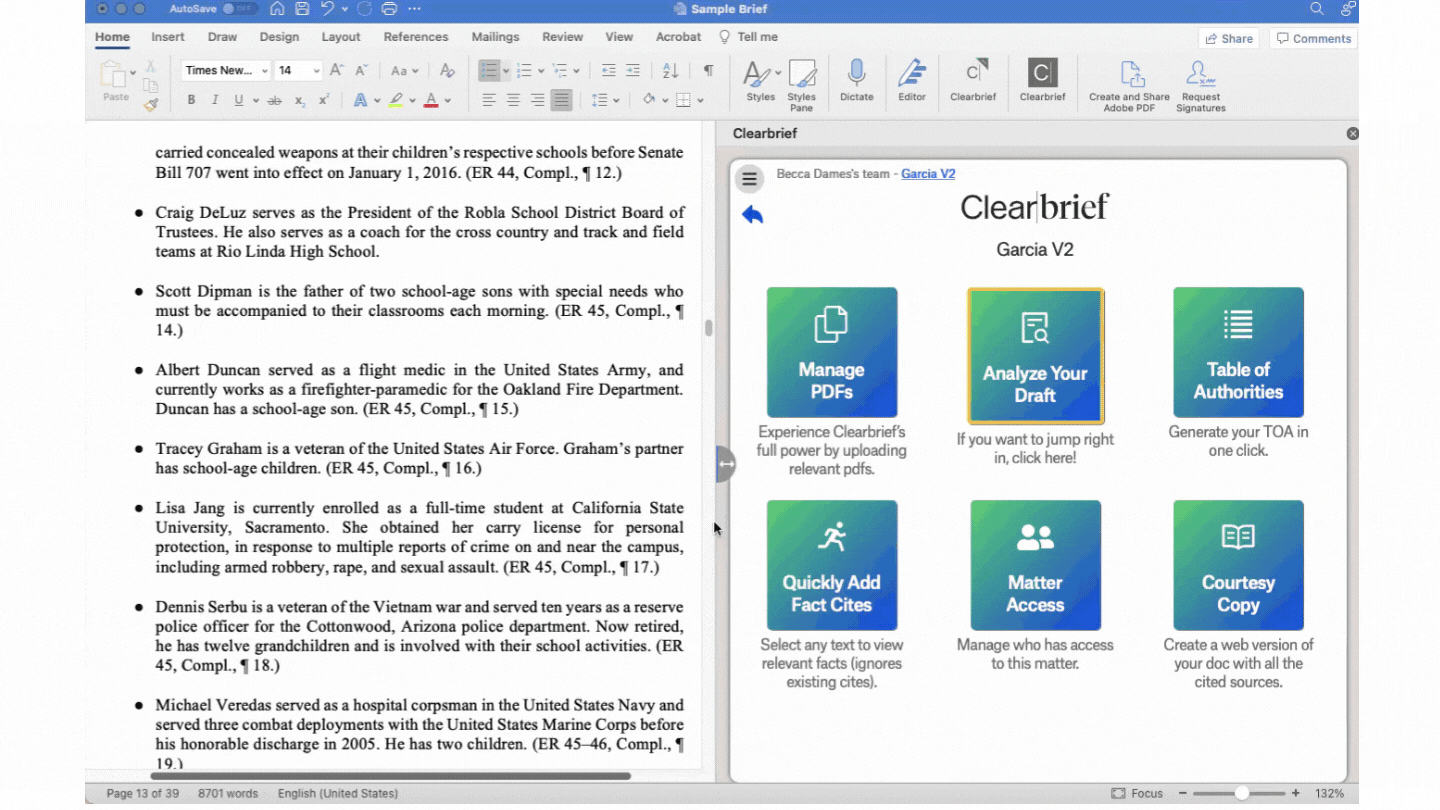As an attorney with Topouzis & Associates, P.C. Tyler Mesmer's practice concentrates on real estate matters and builds on his wide range of experience and curiosity about the law and innovation. He shares his unique career trajectory: how he moved from litigation associate to in-house counsel and back, how he now serves the appellate, trial, and transactional needs of his clients, and how he leverages legal tech like Clearbrief to help him save time searching for source docs to focus on developing legal arguments or taking on new business.
Interested in using Clearbrief to streamline your appellate practice?
Click here to learn about the process from our experienced team members and schedule a demo!
Tell us about your practice.
I am an attorney at Topouzis & Associates, P.C. with 12 years of experience. My practice focuses on civil litigation and appellate law in Florida, and the types of cases I manage mainly involve real estate and title issues. I represent banks, servicers, asset management companies, and other individuals and entities that wish to purchase properties in the state of Florida.
Cases are typically referred to me at the beginning of the matter or at the beginning of the appellate stage. Sometimes I take over more problematic files that are midway through the civil court process.
What attracted you to appellate work, and what changes have you made to your brief writing process over time?
I'm attracted to the complexity of appellate work. I think that's the same reason that I was attracted to Clearbrief: Clearbrief completely removes the time-consuming, busy work I don't enjoy so that I can just focus on analyzing the legal issues.
With Clearbrief, it's like having a team of associates and paralegals combing through the file so that everything is simply ready for my review.
The AI allows me to just focus on the pertinent facts and create the legal argument from there.
Law school doesn't prepare lawyers for all the time they will spend going through voluminous documents. There was never a class that tells future lawyers that they will spend about 75% of their time going through a ton of discovery documents, and other parts of the court file, and then need to remember the exact relevant pages to cite back to later.
Once I learned how to use Clearbrief, I thought, “Oh, this is truly a miracle because all the stuff that I dreaded, having to go through the record and look at the page numbers, with Clearbrief I can just focus on doing the research and putting together the brief. Everything else is done for me.”
What a compliment! Can you share specific examples about how you use Clearbrief in your appellate practice?
Two examples come to mind for how Clearbrief helps my appellate practice. First, the Table of Authorities is created within the blink of an eye with Clearbrief, whereas before it would have taken forever. Second, Clearbrief smooths out the process of preparing a petition for writ of certiorari.
As background, in preparing the writ, advocates must produce their own record which involves creating the exhibit list, adding page numbers, and making everything look exceptionally polished for the court.
When I get to writing the petition, now I use Clearbrief to suggest pages to cite in my record. I learned how to tell Clearbrief how I cite to page numbers in the appellate record and from there Clearbrief gives me suggestions to cite from a very large record. If I remember just one or two facts from the record off the top of my head, Clearbrief will remind me of a good citation to support what I'm saying.

To get more familiar with Clearbrief, I ran briefs I had previously prepared through it. Clearbrief's AI pulled up the docs I had cited to and also pointed out additional suggestions from the record. If I had Clearbrief when I began working on those briefs, I would have been able to save the client hundreds of hours of attorney work because of all the time I spent combing through documents and going back and forth between exhibits. Clearbrief's AI acts as if it remembers everything regardless of what you're paying attention to at the moment. As the attorney, this is great.
But doesn't less time billed mean less money coming in?
There's this wrong belief out there that if you use technology and do things faster, then you can't make as much money because you bill less time to that client. That's a short sighted view.
If you save yourself time on one file, and bill that client less, then you're able to take in more files and bill more for your firm in the aggregate. In fact, I just finished an appeal for a client, and with Clearbrief it cut down the time it would have normally taken by about 25%.
With the time that Clearbrief gave back to me, I was able to put that attention to other files.
My availability opened up for other files that I would have had to turn away or put on the backburner and not be able to bill for.
If you're able to work on more files, you can spend quality time working on those files and you'll bill more overall, even if each individual file is billing the client less. Imagine if before you could serve two people, now with Clearbrief, you can serve five people and those five people will come back to you with their future legal needs.
Technology can free you up to be able to take on the additional files this client will refer to you or already wants to refer to you but you've been busy. Not only are you making the client happier, you're taking in more work for your firm. I think it's a win-win.
As an appellate lawyer, how much of your time is spent writing versus appearing in court?
The pandemic changed a lot with regard to court appearances. Nearly all of the courts in Florida have gone to Zoom hearings almost exclusively so I spend a lot less time in court than I did before. We see this dynamic across the country.
As a result, time that was spent traveling back and forth to the courthouse is freed up, and I can now appear at several hearings in a day rather than just one. So, even with multiple hearings, I have time to do more work.
This is the perfect moment for Clearbrief because there is time to actually focus on the research and writing aspects of advocacy instead of trying to cram everything in. One of the challenges in complex cases with multiple legal issues is that you never know which argument will be the most convincing or with which the panel of judges will ultimately agree. And it's impossible to know whether that will be the winning argument at trial or on appeal.
Clearbrief frees up attorney time within the writing process to focus on finding authorities.
How do you coordinate with paralegals during the writing process?
At the outset of the writing process, paralegals are often tasked with uploading all of the documents and finding record citations that the attorney can refer to. The process of hunting for fact citations takes up a lot of time and requires lots of attention to detail.
I see Clearbrief as saving paralegal time as well as attorney time. The AI software can remind the paralegal and attorney about relevant citations at any moment in the life of a case.
Clearbrief is a great tool for law firms across the board, from solos and boutique firms to large law firms, whether a paralegal, associate, or law partner is reviewing the evidence. Clearbrief doesn't replace lawyers or legal staff; it makes our jobs easier and faster.
I really believe in your product and it means so much to us to have tools like Clearbrief because we work all the time.
What prompted you to transition from an in-house counsel role into a law firm setting, and how does your varied experience benefit clients?
It seems like I'm one of few attorneys who has practiced both litigation in a law firm setting and as in-house counsel. Right out of law school I started as a litigation associate in private practice, and I loved the experience of getting my feet wet in court.
Then I decided that, while I was still young, I wanted to learn the transactional aspects of the field, reviewing contracts and everything that goes with in-house work. I'm genuinely curious about the law and this gave me exposure to many different areas of law. I ultimately went back into the courtroom in my current role because it offered a mix of both transactional and litigation work while adding more appellate work than before.
After going from law firm to in-house and back, I'm really happy doing what I'm doing right now and just trying to get the best results I can for my clients.
What type of service do clients receive with you as their attorney?
I provide extremely diligent, vigorous, and competent representation for my clients. I work around the clock to be there for my clients 24/7 and get them the best results possible.
I think that's the main reason that I got into Clearbrief because I saw it as a way to save time. I can still provide that level of service to my clients and spend less time on the tedious stuff. I believe in your product, because I think that any attorney who wants to provide that level of service and care to clients will want this product.
No attorney will say that they love combing through discovery and looking at documents again and again to make sure that they uncover all of the right pages. Even if an attorney likes reading the record, the quality of their attention can vary over time. You might enjoy reading discovery, but for how long can you effectively review it?
I'm speaking honestly when I say you've answered everyone's prayer with Clearbrief. You really have answered every client's prayer, too, because every attorney who uses Clearbrief will be able to spend more time actually working on the legal aspects of their case. I really don't want to understate how time consuming that can be in and of itself.
Thank you, Tyler!


